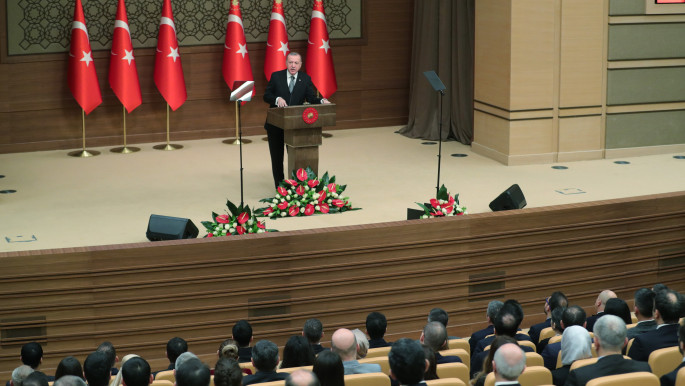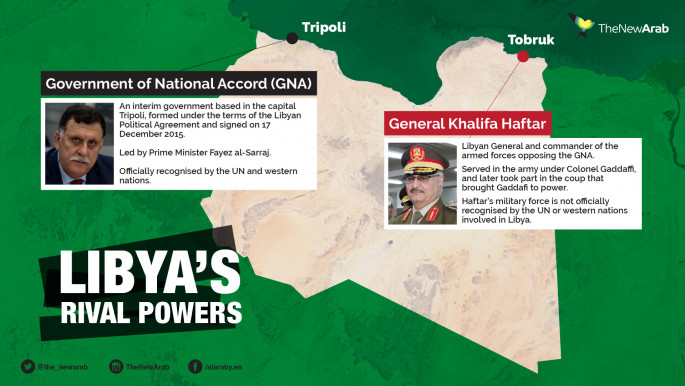Turkey's parliament approves sending troops to Libya
Turkish lawmakers voted 325-184 at an emergency session in favour of a one-year mandate allowing the government to dispatch troops.
"A Libya whose legal government is under threat can spread instability to Turkey," ruling party legislator Ismet Yilmaz argued in defense of the motion.
"Those who shy away from taking steps on grounds that there is a risk will throw our children into a greater danger".
No details have been given on the scale of the potential deployment, and Vice-President Fuat Oktay told state news agency Anadolu on Wednesday that no date had yet been set.
"We are ready. Our armed forces and our defence ministry are ready," he said, adding that parliamentary approval would be valid for a year.
He described the parliament motion as a "political signal" aimed at deterring Haftar's army.
"After it passes, if the other side changes its attitude and says, 'OK, we are withdrawing, we are abandoning our offensive,' then what should we go there for?"
Last week, Turkish President Recep Tayyip Erdogan sent a motion to parliament to approve a military deployment in support of the UN-backed government.The Tripoli-based government of Libyan Prime Minister Fayez al-Sarraj has faced an offensive by the rival east-based government and commander Gen. Khalifa Hafter in fighting that has threatened to plunge Libya into violence rivaling the 2011 conflict that ousted and killed longtime dictator Muammar Gaddafi.
Erdogan said last month that Sarraj requested the Turkish deployment, after he and Sarraj signed a military deal that allows Ankara to dispatch military experts and personnel to Libya.
That deal, along with a separate agreement on maritime boundaries between Turkey and Libya, has drawn ire across the region and beyond.
Details of the Turkish deployment have not been revealed.
Ankara says the deployment is vital for Turkey to safeguard its interests in Libya and in the eastern Mediterranean, where it finds itself increasingly isolated as Greece, Cyprus, Egypt and Israel have established exclusive economic zones paving the way for oil and gas exploration.
Turkey's main opposition party has criticised the vote and argued sending troops would embroil Turkey in another conflict and make it a party to the "shedding of Muslims' blood." It has called on Erdogan's government to search for a diplomatic solution in Libya instead.
The fighting around Tripoli escalated in recent weeks after Hafter declared a "final" and decisive battle for the capital.
He has the backing of the United Arab Emirates and Egypt, as well as France and Russia, while the Tripoli-based government receives aid from Turkey, Qatar and Italy.
 |
| Turkish President Recep Tayyip Erdogan makes a speech as he attends the Symposium on Urban Security [Getty] |
Escalation warning
Turkey's intervention in Libya has been met with concern from human rights groups, and the UN's Libya envoy said Monday that military and maritime agreements signed between Turkey and the Tripoli government represent an "escalation" of the conflict in the North African country.
Ghassan Salame's remarks came as Egypt called for an urgent meeting Tuesday of the Cairo-based Arab League to discuss "developments in Libya and the possibility of an escalation" there.
Libya has been mired in conflict since an uprising toppled and killed dictator Muammar Gaddafi in 2011, with rival administrations in the east and the west vying for power.
In April, military strongman Khalifa Haftar, who is based in the east, launched an assault to seize the capital Tripoli from the UN-recognised Government of National Accord.
In November, Ankara signed a security and military cooperation deal with the GNA and also inked a maritime jurisdiction agreement with the Tripoli government.
Speaking to French daily Le Monde, the UN envoy said the agreements signed between Ankara and the GNA represent "a clear escalation of the conflict" in Libya.
He also deplored what he called the "internationalisation of the conflict", which has deepened further this year, drawing in a plethora of external forces and powers.
"We have seen mercenaries from several nationalities, including Russians, arrive (in Libya) to support Haftar's forces in Tripoli," he said.





 Follow the Middle East's top stories in English at The New Arab on Google News
Follow the Middle East's top stories in English at The New Arab on Google News
![Israeli forces ordered bombed Gaza's Jabalia, ordering residents to leave [Getty]](/sites/default/files/styles/image_330x185/public/2176418030.jpeg?h=a5f2f23a&itok=_YGZaP1z)

